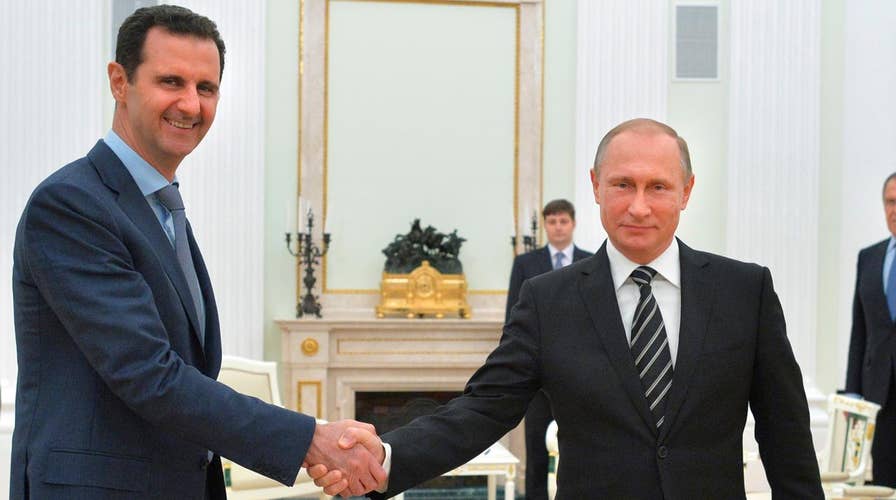How Russia's support for Syria impacts international policy
Conflict felt across the entire Middle East
The United Nations' renewed efforts to play a lead role in settling the Syria crisis have only renewed questions about the world body's shortcomings keeping a check on the Assad regime so far.
The U.N. and Organization for the Prohibition of Chemical Weapons – an independent organization that works with it – led the operation to remove and destroy Syria’s chemical weapons in 2013 under an agreement between the Obama administration and Russia.
Then-President Barack Obama chose the U.N.-led option after Bashar Assad used chemical weapons near Damascus in 2013. In his 2014 State of the Union address, Obama hailed the process as a diplomatic victory, proclaiming "Syria’s chemical weapons are being eliminated."
The declaration was premature. Following a chemical weapons attack in Idlib province earlier this month, which the U.S. believes was carried out by the Assad regime, the Trump administration responded by launching strikes on an Assad-controlled airfield.
But despite the apparent failure to oversee a complete weapons purge, Russia once again wants the U.N.-OPCW to take the lead. Russian Foreign Minister Sergey Lavrov last week called on the groups to investigate the use of chemical weapons in Idlib and the site of the U.S. strikes.
“We think that it is absolutely necessary to conduct a thorough, objective, professional, and unbiased investigation,” Lavrov said. “We will insist that the OPCW and the U.N. in New York urgently send inspectors both to the site of the incident and the airfield itself, where, according to Western experts, the munitions were loaded with chemicals.”
Reuters reported that the OPCW already has dispatched investigators to Turkey to collect samples. The mission reportedly will determine if chemical weapons were used, but will not assign blame. The results are expected in May and will be be passed to a U.N.-OPCW investigation. An OPCW spokesman declined to comment on ongoing investigations to Fox News.
U.N. special envoy to Syria Staffan de Mistura also says a U.N.-led negotiation process is “the only way out of the Syrian nightmare.” Addressing the Security Council last week, he said Russia and the United States “must find a way to work together” to stabilize the situation, and the U.N. is ready to lead.
But some have expressed skepticism about the U.N.'s ability to act on that front as well, at least without a shift from Russia.
"I think the U.N. Security Council is a diplomatic dead end as long as Russia blocks any effective action with its veto," Jim Phillips,
senior research fellow for Middle Eastern affairs at The Heritage Foundation, told Fox News.
Back in 2014, the U.N. voiced confidence about its Syria efforts.
In April of that year, Sigrid Kaag, who was appointed by then-Secretary General Ban Ki-moon to oversee the joint mission, said all but 8 percent of weapons had been removed.
“In order to produce, to prepare, to launch [chemical weapons], you need the production facilities, you need the munition and filling capability, you need the tactical munitions – all those have been destroyed,” Kaag told the BBC.
"So what remains at one site are elements of chemical weapons, but the chemical weapons program of Syria, as per the current declaration of Syria under the Chemical Weapons Convention, is no longer in existence.”
In June came the “Mission Accomplished” moment when the U.N.-OPCW mission announced that 100 percent had been removed.
Kaag noted in an interview that the 100 percent number only referred to the chemicals declared by Syria, and noted at the time there were still questions about Syria’s declaration. However, she hailed the moment as a “major milestone.”
Then-Secretary of State John Kerry declared victory, and said in a statement that “100 percent of the declared chemicals are out of war-torn Syria.”
Kerry’s clarification of “declared chemicals” was not repeated in a "Meet the Press" appearance in July where he said: “we struck a deal where we got 100 percent of the chemical weapons out.”
In January 2017, former National Security Adviser Susan Rice also made a qualified statement.
“We were able to find a solution that didn’t necessitate the use of force that actually removed the chemical weapons that were known from Syria. ... We were able to get the Syrian government to voluntarily and verifiably give up its chemical weapons stockpile,” she said in an interview with NPR.
However, there had been doubts about the "100 percent" figure almost as soon as it was announced. Even in its congratulatory statement, the Obama White House noted questions about “omissions and discrepancies in Syria’s declaration to the OPCW and about continued allegations of use.”
In a July 2016 report, the OPCW also noted an increase in a “number of outstanding issues requiring clarification” from the Syrian government. The report noted that samples at multiple locations revealed “the presence of unexpected or undeclared chemical compounds” that could indicate undeclared chemical warfare agents.
It concluded that as a result, the OPCW was not sure if the declaration could be considered accurate.
“At present, the Secretariat is not able to resolve all identified gaps, inconsistencies and discrepancies in Syria’s declaration, and therefore cannot full verify that Syria has submitted a declaration that can be considered accurate and complete in accordance with the Chemical Weapons Convention or Council decision … dated 27 September 2013.”

